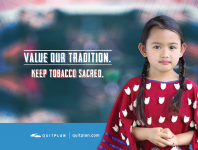WTF Anti-Smoking Ad
- Thread starter SoddenJack
- Start date
You are using an out of date browser. It may not display this or other websites correctly.
You should upgrade or use an alternative browser.
You should upgrade or use an alternative browser.
SmokingPipes.com Updates
Watch for Updates Twice a Week
- Status
- Not open for further replies.
I keep tobacco sacred. Every. Time. I. Smoke. My. Pipes.
So the implication is that it's somehow culturally offensive to Native Americans to smoke tobacco? Sigh...
I mean, I'm a pretty progressive, PC guy and all, but what is this, the woke olympics?
Is this ad is being produced by non-natives (which it likely is), it's pretty offensive IMO to use that message for anti-smoking purposes.
I mean, I'm a pretty progressive, PC guy and all, but what is this, the woke olympics?
Is this ad is being produced by non-natives (which it likely is), it's pretty offensive IMO to use that message for anti-smoking purposes.
I haven't seen that angle before...but then I don't normally get much exposure to the antis propaganda.
Assuming it is new, I wonder what took them so long to add the "cultural appropriation" canard to their arsenal.
And here it's combined with the "for the children" trope. They'll likely get some mileage out of that.
Assuming it is new, I wonder what took them so long to add the "cultural appropriation" canard to their arsenal.
And here it's combined with the "for the children" trope. They'll likely get some mileage out of that.
yeah because the tobacco companies as part of the settlement for hiding info about the dangers of cigs have to make anti-smoking ads. Ever since that ruling it's seemed like a lot of antismoking ads suddenly got that advertising for smoking thing. The first example I saw was this ad with the dorkiest teens talking about why they don't smoke. I mean those kids where about as dorky as could be. What we would call a nerd would have given those kids a swirly. Seriously I bet if you traced the money on this ad it would go right back to one of the big tobacco companies.View attachment 63089
I get that this is supposed to be part of anti-smoking campaign, but it seems like they’re promoting it.
It's also the convergence towards the new global religion BS: the religion of the "mother" Earth. In tune, now the demonisation of smokers is being pushed further from selfish, unhealthy polluters, to heretical planet-killers and sinners against the Pachamama.I haven't seen that angle before...but then I don't normally get much exposure to the antis propaganda.
Assuming it is new, I wonder what took them so long to add the "cultural appropriation" canard to their arsenal.
And here it's combined with the "for the children" trope. They'll likely get some mileage out of that.
Might be referring to Native Americans using tobacco as an offering instead of smoking. Whenever I pick sage for the wife I always scatter tobacco in the area I harvest the sage.
It’s kind of like the commercial about littering where the tear comes down the Native American’s face ... yet the guy was a white actor of Italian descent.So the implication is that it's somehow culturally offensive to Native Americans to smoke tobacco? Sigh...
I mean, I'm a pretty progressive, PC guy and all, but what is this, the woke olympics?
Is this ad is being produced by non-natives (which it likely is), it's pretty offensive IMO to use that message for anti-smoking purposes.
It looks like a lot of their ads are targeted to the native population in Minnesota. So I am thinking this ad is directed toward one of Native American descent. Saying “use the tobacco in a sacred way as we used to” instead of smoking it just for pleasure.View attachment 63089
I get that this is supposed to be part of anti-smoking campaign, but it seems like they’re promoting it
I don’t believe they are trying to direct this ad toward non-native peoples. If they are, then yes, the message is even more dumb.
It’s ironic. All the reservations out here buy gigantic billboards that advertise the lowest price cigarettes anywhere. No tax
Right plus “smoke shops” all over them. But I’d say the message here is appealing to their sense of tradition and saying that’s not the right way. An interesting perspective.It’s ironic. All the reservations out here buy gigantic billboards that advertise the lowest price cigarettes anywhere. No tax.
it would be like if people ate the Catholic communion host as a snack. Then the church comes out with an ad directed at Catholics saying “keep the host sacred. Use it only in church as intended”. So I get their angle.
Posted By Toyacoyah Brown November 13th, 2016 Last Updated on: November 24th, 2019
A new documentary exploring tobacco use among American Indians in Minnesota will premiere on public television this month. Created by Dakota/Diné producer Leya Hale with input from Anishinaabe and Dakota elders, Reclaiming Sacred Tobacco features dozens of Minnesota American Indians telling their tobacco stories and discussing how tobacco traditions were corrupted by the commercial tobacco industry. Coproduced by ClearWay Minnesota and Twin Cities PBS, the program shows how restoring traditional tobacco ways can help undo the harms of the tobacco industry and improve health in Indian Country.
“In Minnesota, American Indians smoke cigarettes at a rate of 59 percent – four times the rate of the general population,” said Nicole Toves Villaluz, who manages tribal grant-making for ClearWay Minnesota. “We saw this project as a way to raise awareness of historical and current traditional tobacco practices and to understand commercial tobacco abuse in our tribal communities.”
Told entirely from the viewpoint of American Indians, Reclaiming Sacred Tobacco explores how plants that were four sacred medicines for indigenous people were exploited for profit by tobacco companies, creating epidemic-level health problems for Natives. At the same time, it shows how American Indians in Minnesota are working to restore traditional tobacco practices, to reduce commercial tobacco abuse like cigarette smoking, and to prevent secondhand smoke exposure.
“We plan to share this program with our tribal community partners, where it can help us remember the difference between sacred and commercial tobacco,” said Villaluz. “And we hope the PBS audience will learn about the health disparities experienced by American Indians, and support culturally-driven efforts to improve health equity for our people.”
The program will debut on tpt's MN Channel on November 13 at 7 p.m. and will continue to air on PBS stations through the end of November. Following the premiere, the program can also be viewed on the Twin Cities PBS website and at www.clearwaymn.org/KeepTobaccoSacred.
ClearWay Minnesota is an independent, nonprofit organization that improves the health of Minnesotans by reducing the harm caused by tobacco. ClearWay Minnesota serves Minnesota through its grant-making program, QUITPLAN® stop-smoking services and statewide outreach activities. It is funded with 3 percent of the state's 1998 tobacco settlement.
A new documentary exploring tobacco use among American Indians in Minnesota will premiere on public television this month. Created by Dakota/Diné producer Leya Hale with input from Anishinaabe and Dakota elders, Reclaiming Sacred Tobacco features dozens of Minnesota American Indians telling their tobacco stories and discussing how tobacco traditions were corrupted by the commercial tobacco industry. Coproduced by ClearWay Minnesota and Twin Cities PBS, the program shows how restoring traditional tobacco ways can help undo the harms of the tobacco industry and improve health in Indian Country.
“In Minnesota, American Indians smoke cigarettes at a rate of 59 percent – four times the rate of the general population,” said Nicole Toves Villaluz, who manages tribal grant-making for ClearWay Minnesota. “We saw this project as a way to raise awareness of historical and current traditional tobacco practices and to understand commercial tobacco abuse in our tribal communities.”
Told entirely from the viewpoint of American Indians, Reclaiming Sacred Tobacco explores how plants that were four sacred medicines for indigenous people were exploited for profit by tobacco companies, creating epidemic-level health problems for Natives. At the same time, it shows how American Indians in Minnesota are working to restore traditional tobacco practices, to reduce commercial tobacco abuse like cigarette smoking, and to prevent secondhand smoke exposure.
“We plan to share this program with our tribal community partners, where it can help us remember the difference between sacred and commercial tobacco,” said Villaluz. “And we hope the PBS audience will learn about the health disparities experienced by American Indians, and support culturally-driven efforts to improve health equity for our people.”
The program will debut on tpt's MN Channel on November 13 at 7 p.m. and will continue to air on PBS stations through the end of November. Following the premiere, the program can also be viewed on the Twin Cities PBS website and at www.clearwaymn.org/KeepTobaccoSacred.
ClearWay Minnesota is an independent, nonprofit organization that improves the health of Minnesotans by reducing the harm caused by tobacco. ClearWay Minnesota serves Minnesota through its grant-making program, QUITPLAN® stop-smoking services and statewide outreach activities. It is funded with 3 percent of the state's 1998 tobacco settlement.
I took a look at their site. They're sending a real mixed, messed up message:
Judging from the ad in post #1, they're targeting solely the Indians (who've traditionally held tobacco as sacred and so the ad would appear to make sense—except that to the Indians the act of smoking tobacco was sacred too—so, they'd already be messing up with religious precepts/practices by telling them not to smoke it, but... anyway).
Judging from their site's photos, the first page shews a couple of Indian women, so it would seem that yes, their target audience is Indians. But... browsing to other pages you have many black people, the occasional white person, and even one who looks Japanese. WTF. From their copy, you'd surmise that their targets are coloured and Indians. Mmmkay...
But then, judging from their statements in that site.... they're saying their services/programs are open to everyone (!!). W T F
Real mixed. Real confusing. Real eclectic. Real BS.
Judging from the ad in post #1, they're targeting solely the Indians (who've traditionally held tobacco as sacred and so the ad would appear to make sense—except that to the Indians the act of smoking tobacco was sacred too—so, they'd already be messing up with religious precepts/practices by telling them not to smoke it, but... anyway).
Judging from their site's photos, the first page shews a couple of Indian women, so it would seem that yes, their target audience is Indians. But... browsing to other pages you have many black people, the occasional white person, and even one who looks Japanese. WTF. From their copy, you'd surmise that their targets are coloured and Indians. Mmmkay...
But then, judging from their statements in that site.... they're saying their services/programs are open to everyone (!!). W T F
Real mixed. Real confusing. Real eclectic. Real BS.
There you go. So in other words we stole their sacred plant and sold it back to them at great cost both monetarily and health-wise.Posted By Toyacoyah Brown November 13th, 2016 Last Updated on: November 24th, 2019
A new documentary exploring tobacco use among American Indians in Minnesota will premiere on public television this month. Created by Dakota/Diné producer Leya Hale with input from Anishinaabe and Dakota elders, Reclaiming Sacred Tobacco features dozens of Minnesota American Indians telling their tobacco stories and discussing how tobacco traditions were corrupted by the commercial tobacco industry. Coproduced by ClearWay Minnesota and Twin Cities PBS, the program shows how restoring traditional tobacco ways can help undo the harms of the tobacco industry and improve health in Indian Country.
“In Minnesota, American Indians smoke cigarettes at a rate of 59 percent – four times the rate of the general population,” said Nicole Toves Villaluz, who manages tribal grant-making for ClearWay Minnesota. “We saw this project as a way to raise awareness of historical and current traditional tobacco practices and to understand commercial tobacco abuse in our tribal communities.”
Told entirely from the viewpoint of American Indians, Reclaiming Sacred Tobacco explores how plants that were four sacred medicines for indigenous people were exploited for profit by tobacco companies, creating epidemic-level health problems for Natives. At the same time, it shows how American Indians in Minnesota are working to restore traditional tobacco practices, to reduce commercial tobacco abuse like cigarette smoking, and to prevent secondhand smoke exposure.
“We plan to share this program with our tribal community partners, where it can help us remember the difference between sacred and commercial tobacco,” said Villaluz. “And we hope the PBS audience will learn about the health disparities experienced by American Indians, and support culturally-driven efforts to improve health equity for our people.”
The program will debut on tpt's MN Channel on November 13 at 7 p.m. and will continue to air on PBS stations through the end of November. Following the premiere, the program can also be viewed on the Twin Cities PBS website and at www.clearwaymn.org/KeepTobaccoSacred.
ClearWay Minnesota is an independent, nonprofit organization that improves the health of Minnesotans by reducing the harm caused by tobacco. ClearWay Minnesota serves Minnesota through its grant-making program, QUITPLAN® stop-smoking services and statewide outreach activities. It is funded with 3 percent of the state's 1998 tobacco settlement.
That's the way I'm reading into it and it seems that back in 2016 on the pbs program debut was their start of a grassroots campaign?There you go. So in other words we stole their sacred plant and sold it back to them at great cost both monetarily and health-wise.
I think it's more like here is your excuse. Go ahead chain smoke Camels just make sure you give some lip service to the sacred traditions.Right plus “smoke shops” all over them. But I’d say the message here is appealing to their sense of tradition and saying that’s not the right way. An interesting perspective.
it would be like if people ate the Catholic communion host as a snack. Then the church comes out with an ad directed at Catholics saying “keep the host sacred. Use it only in church as intended”. So I get their angle.
I don’t think they are saying that. Rather that it should ONLY be used to sacred traditions.I think it's more like here is your excuse. Go ahead chain smoke Camels just make sure you give some lip service to the sacred traditions.
Yup exactly. I agree wholeheartedly with the idea. Honestly we did similar things to them with alcohol.That's the way I'm reading into it and it seems that back in 2016 on the pbs program debut was their start of a grassroots campaign?
As a Shawnee descendant, I find this tactic appalling. If the antis want to push their goals, use science not cultural propaganda. To me tobacco is sacred medicine. It prevents coworkers from breaking out in welts, bruises, and suffering blood loss.
How much $$ do you get from the tribe?As a Shawnee descendant, I find this tactic appalling. If the antis want to push their goals, use science not cultural propaganda. To me tobacco is sacred medicine. It prevents coworkers from breaking out in welts, bruises, and suffering blood loss.
- Status
- Not open for further replies.









